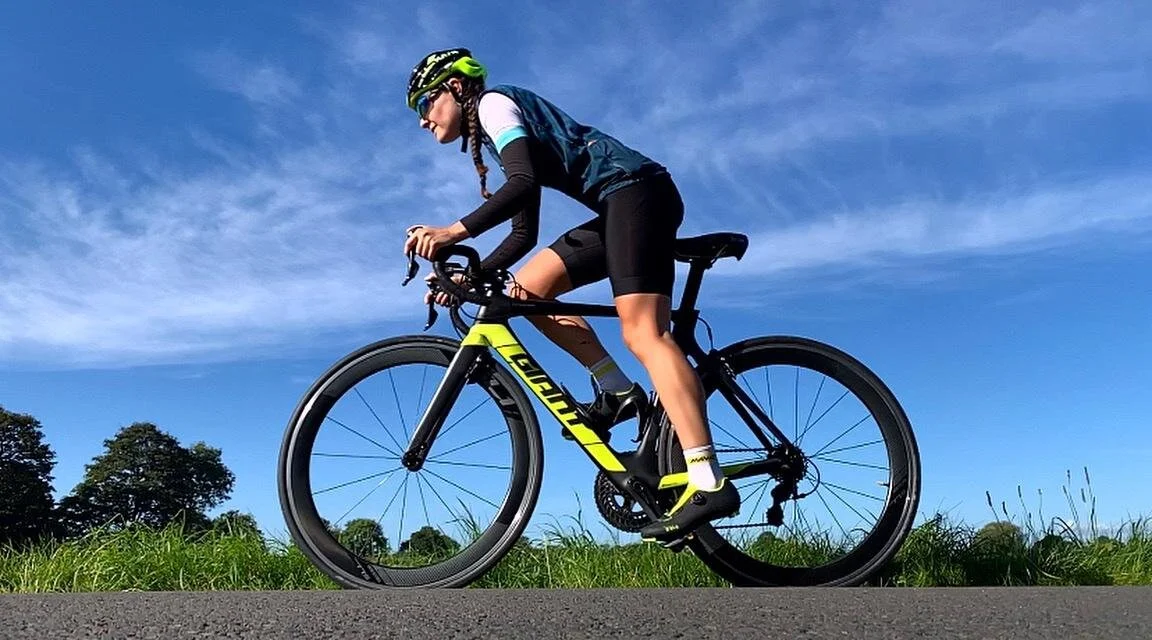In April 2018 I started my coaching journey with Hard & Smart. From our very first meeting, I made the decision to be honest with myself and my coach at all times and to always be unapologetically me. At the time I started training properly and with intent I was recovering from an eating disorder and had severe anxiety and panic attacks. Here is what I’ve learnt along the way.
Missing sessions. Everyone loves that all green week on Training Peaks, right? Of course you do, it looks pretty and it’s satisfying knowing you’ve hit every session. But what about when it goes wrong, and there are missed sessions?
It’s stressful when things don’t go to plan. I love organisation and don’t cope very well with change, but it’s something I’m working on. Last year, if I was struggling to fit a session in, or something got in the way, I would have squeezed that session in at another point in the week. Ultimately, this session and usually subsequent ones weren’t then good quality because I spent so much time and energy worrying about getting it done. On the flip side, if I didn’t manage to do the session I would panic. I was letting myself down, my coach down, everything was going wrong. Just from missing one session.
It’s taken me a while to unlearn this behaviour and to really appreciate having a coach who is only a text away who can help talk through how to tweak your plan.
There is no such thing as a silly question. I used to get myself worked up in knots about asking questions - I would rephrase them, type them out and then delete them, sit there in silence in our catch ups. But your coach is there for you. If you don’t understand a session, then ask. If you need help with your bike, ask!
Do what makes you happy. I joined a triathlon club, got a triathlon coach, and I had my sights set on the World Triathlon Championships. Nothing like being ambitious! Whilst I will be eternally grateful that I did make it to the Gold Coast, I cannot honestly say it was worth the sacrifice to my mental health along the way. It was the swim training which undid me. I’ve always been pretty mediocre in the water, so clearly this was what I needed to work on. The problem was I hated swim training. I hated being in a swimming costume, I hated not being able to breathe, I hated feeling awful after every swim. To me, it was something I had to do to ‘be a proper athlete’ and to be worthy of having a coach. So I stuck with it, had panic attacks before every session, had panic attacks in the pool and as a result, my training suffered.
Not long after the World Championships, I’d decided I’d had enough and stopped swimming all together and it was the best decision I’ve made. I love cycling and running, I love duathlons - so why continue with something that gives me so much anxiety. It felt scary at the time, comparing myself to other people but slowly I realised that in choosing what was best for me, I am so much happier.
You don’t need to follow the crowd because it’s what everyone else seems to do. Everyone is on their own path, with their own goals and their own strengths and weaknesses. If there’s something you’re really not enjoying - be it a sport, or training venue, group sessions etc. ask yourself, why? Talk the issue through with your coach and work towards a solution. For me, it meant I stopped swimming all together - and I’ve never looked back - but for you, it may mean changing your gym, or who you train with. Don’t sacrifice your own happiness to fit in with others.
Strava. Hands up who’s a #StravaStalker? We’ve all been there. Looking at how fast they’ve gone, or how far, or how low their heart rate is. About a year ago, I unfollowed and blocked everyone on my Strava account. I was spending far too much time comparing myself to others, rather than looking at my own data and I’d realised that this behaviour was not good for my mental health. By streamlining my account I was more focussed on my training and my progress - it’s something I would recommend doing at some point, if only temporary!
Instagram. Ahh yes. #Content #NoFilter #FitFam Truly the one of the best and worst things about smart phones. I love taking photos of anything outside and scenic, and for some reason I can’t help posting them. It’s like a compulsion. Which is fine! They’re (in my opinion) nice pictures. The trouble, once again, comes when you start comparing yourself to others. Instagram hosts a wealth of fitness accounts, many of them friends, athletes we know by name and a barrage of pros we all follow to be inspired by. So how do you sort out what’s real and what’s just done ‘for the ‘gram’? People rarely post about their bad training days, everything is always #Fab and #BestDayEver. Instagram is a way to #ShowOff - and whilst there is nothing wrong with that at all, it’s important to be mindful that when you’re scrolling through someones profile, you’re seeing the highlight reel and not the full story.
Learn to trust your coach whole-heartedly. They want the best for you and cannot plan your training effectively if you hold all your cards too close to you chest. By being honest and acknowledging when I’m struggling I have become a better athlete. You can be in the best physical shape of your life, but if your mental game isn’t strong, you will suffer when it counts. A coaching relationship works two ways. The more you give your coach, the more they can give you back.
It is OK to miss a session. It is OK to have a day/week/month off. It is OK to say no. It is OK to slow down.
If you keep pushing your mental health, it will take you far longer recover and get back on track. It is worth taking one day off to save you mentally crashing and needing to take two months off further down the line.
As I’ve grown as an athlete, I’ve also reached a point where I consider myself to be fully recovered. The lessons I’ve learned through having a coach have translated far beyond the physical aspects of training and I can apply them to every day life. One of my favourites, is ‘Control the controllables’. It’s a phrase I often come back to if I’m worrying about a particular situation and helps me to have a more rational thought process.

